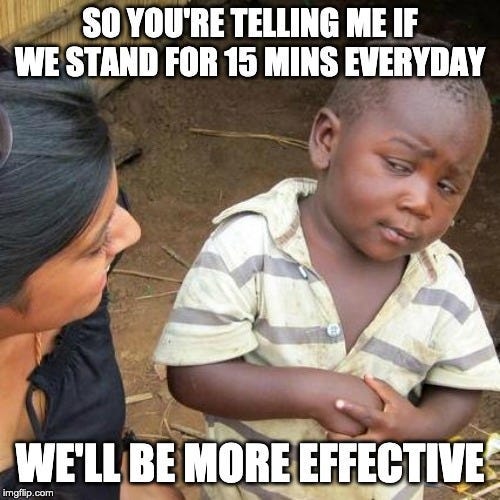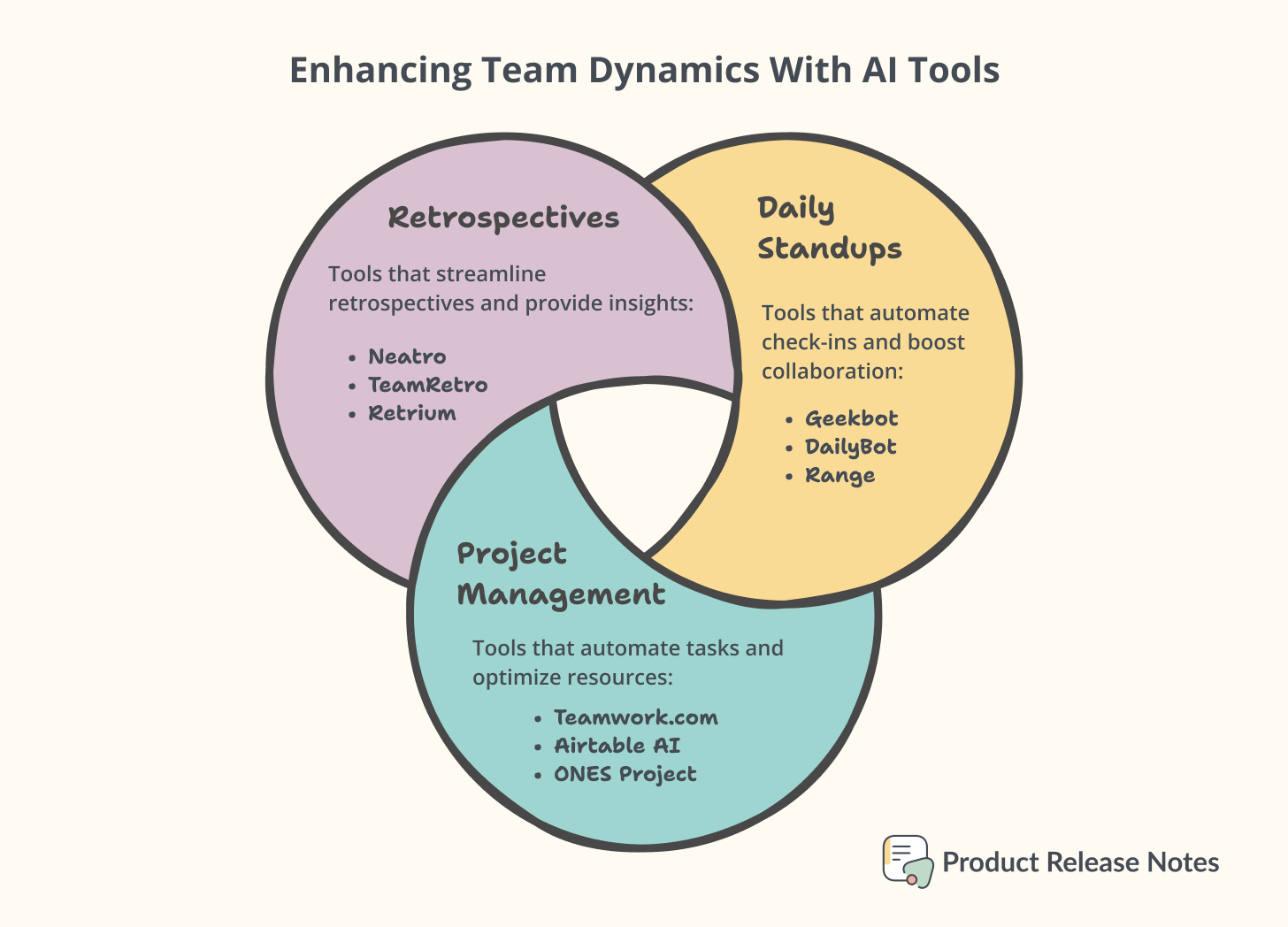Why Your Team Wants AI Over Useless Scrum Ceremonies
A brutally simple guide to stop clinging to outdated processes that drain your teams energy and start leveraging AI where it matters most.
Picture this: you're sitting in yet another daily standup, asking the same three questions you've been asking for months, if not years:
"What did you do yesterday? What will you do today? Any blockers?"
Worse, you see how the scrum master runs it by simply picking people and not even asking any questions…
The answers are predictable, the energy is low, and you can practically see your team's souls leaving their bodies. 👻 Even more frustrating, the Scrum master complains about the team's lack of communication and late risk detection.
Meanwhile, your developer had the idea to build a simple bot in 30 minutes that asks "how is development going?" every 3 hours, and he believes it will generate more useful insights than your scrum master in a month.
Did he get it right? Your developer wasn't being sarcastic, he was being strategic.
The uncomfortable truth is that many of the agile ceremonies have become bureaucratic theater rather than value-generating activities. But before you panic about AI stealing your job, let me share something liberating: AI is here to free us from the mundane so we can focus on what actually matters.
We Have To Wake Up
What Your Team Really Thinks About Your Ceremonies
Let's start with the elephant in the room. That developer who suggested a bot to replace the scrum master? They weren't being disrespectful. They were highlighting something we've all been thinking but rarely say out loud: many of the agile and scrum rituals have lost their purpose and become expensive time sinks.
Data from LinearB shows that 87% of developers feel their daily standups don't provide value to them personally. They show up because they have to (obliged), not because they're getting meaningful coordination or problem-solving help.
💡 To me, the real question isn't whether AI can replace these ceremonies. It's whether these ceremonies, in their current form, are worth preserving at all.
Where AI Actually Shines
Before we dive into specific use cases, let's establish some ground truth. AI excels at three things that traditional agile ceremonies struggle with:
🧩 Pattern Recognition: AI can spot trends across multiple data sources that humans miss in the moment.
🗓️ Consistency: Unlike humans, AI doesn't have bad days, forget to ask follow-up questions, or let biases creep into facilitation.
📊 Data Integration: AI can pull insights from Jira, Slack, GitHub, and meeting transcripts simultaneously to provide holistic project health views.
But here's what AI can't do: create psychological safety, resolve interpersonal conflicts, or inspire a team through shared vision.
The magic happens when we use AI to handle the administrative overhead so humans can focus on the human elements.
By now, I see 3 events that can be automated to generate better insights:
Daily standups,
Retrospectives and
Project management activities
Daily Standups
From Status Updates to Real Insights
The Reality
Most daily standups have devolved into status reports that could have been an email. Team members robotically recite their yesterday/today/blockers while everyone else mentally checks out.
The AI Approach
Tools like Standuply, Geekbot, and ScrumGenius are already transforming how teams handle daily coordination. Here's what they do better than traditional standups:
Asynchronous Collection: Team members provide updates when it's convenient for them, not when the calendar dictates.
Intelligent Follow-ups: AI asks clarifying questions based on previous responses and identifies patterns that need human attention.
Blocker Detection: Instead of waiting for someone to volunteer that they're stuck, AI proactively identifies stalled work and suggests interventions.
Real-time Dashboards: Teams get visual representations of progress, dependencies, and potential issues without sitting through verbal reports.
One team I know replaced their daily standup with a Slack bot that asks three simple questions throughout the day. The result? 40% more actual collaboration because developers could quickly identify when they needed each other's help, rather than waiting 24 hours for the next official check-in.
AI tools to try
Geekbot: Runs async check-ins in Slack/Teams, spotting blockers fast to boost collaboration without disrupting workflows.
DailyBot: Automates updates and morale checks via chat, saving time on meetings while encouraging quick, honest feedback.
Range: Provides flexible async tools for progress tracking, helping distributed teams stay aligned without forced sync-ups.
Sprint Retrospectives
From Venting to Actions
The Reality
How many retrospectives have you attended where the same issues get raised sprint after sprint, but nothing meaningful changes? Teams struggle to identify patterns, actions items get forgotten, and the whole exercise feels like performative improvement theater once again…
The AI Approach
AI-enhanced retrospectives are where the technology really shows its value. Here's what's possible:
Sentiment Analysis: AI can analyze Slack messages, commit comments, and meeting transcripts to identify team morale trends before they become obvious problems.
Pattern Recognition: Instead of relying on human memory, AI can surface recurring themes across multiple sprints and suggest targeted interventions.
Action Item Intelligence: AI can automatically generate SMART goals based on discussion themes and track progress on previous retrospective commitments.
Format Suggestions: AI can recommend retrospective formats based on your team's current challenges and dynamics.
AI tools to try
Neatro: Streamlines retros with AI templates and action tracking, freeing teams to focus on real improvements instead of manual note-taking.
TeamRetro: Delivers AI insights on team health and patterns, turning vague venting into actionable plans with easy integrations.
Retrium: Facilitates engaging sessions with sentiment analysis, helping remote teams spot morale issues early and build psychological safety.
Project Management Checks
From Busy Work to Strategic Focus
The Reality
Project and program managers spend an estimated 50% of their time on administrative tasks: updating status reports, chasing updates, reconciling conflicting information across tools, and preparing presentations for stakeholders.
The AI Approach
Modern AI project management tools are automating the busywork so humans can focus on strategy and leadership:
Automated Reporting: AI can pull data from multiple sources and generate status reports, risk assessments, and budget updates automatically
Predictive Analytics: Instead of reactive problem-solving, AI can predict potential delays, budget overruns, and resource conflicts weeks in advance
Intelligent Resource Allocation: AI can optimize team assignments based on skills, workload, and project priorities
Stakeholder Communication: AI can customize communication for different audiences, ensuring executives get high-level summaries while developers get technical details
🔎 Research shows that project managers using AI-enhanced tools spend 70% more time on strategic activities and see 32% better project outcomes.
AI tools to try
Teamwork.com: Automates reporting and task allocation with AI, letting PMs shift from admin work to strategic leadership.
Airtable AI: Flags risks and optimizes resources intelligently, reducing overhead for proactive project oversight.
ONES Project: Predicts issues with AI templates, enabling faster adjustments and more time for team mentoring.
What AI Can't Replace Yet
While AI excels at data processing and routine coordination, there are critical areas where human leadership remains irreplaceable:
Conflict Resolution: When team members disagree about technical approaches or feel their concerns aren't being heard, you need human empathy and negotiation skills.
Vision Setting: AI can optimize execution, but humans must define what success looks like and inspire teams to pursue it.
Cultural Change: Transforming how teams work requires understanding organizational dynamics, psychology, and the subtle art of influence.
Crisis Management: When projects go sideways, teams need leaders who can think creatively, make tough decisions under pressure, and maintain morale through uncertainty.
I believe the most effective teams will use AI to handle the predictable so humans can focus on the exceptional.
How My Team Will Transition
That developer I was talking about is part of my team. As a leader, I can't stand idly by and do nothing, so what I'm going to do is start implementing his idea with the gaps in our current process.
My team’s simple roadmap to AI experimentation
I don’t think trying to AI-ify everything at once is the right way. So we’ll pick one ceremony or routine that's clearly not working and experiment with automation:
Week 1: We are going to choose the biggest pain point and agree to this experiment.
Week 2-4: Then, we'll implement a simple AI tool and run it parallel to your existing process. Here our dev already has some code so maybe he’ll be in charge of that.
Week 5-6: Compare results and gather team feedback
Week 7-8: Iterate on the approach based on what we've learnedWhat we want to achieve with this
The goal isn't to use AI for its own sake. It's to improve specific outcomes in our team:
✅ Faster problem identification and resolution
✅ More time for strategic work and team development
✅ Better data-driven decision making
✅ Reduced administrative overhead
✅ Increased team satisfaction and engagement
Things we have to take care of
I’ve seen it before, introducing AI tools can be overwhelmed but I’ll be transparent about the why and the what's-not-changing with my team. Here’s how I plan to do so:
Communicate the Purpose: Explain that AI is meant to enhance human capabilities, not replace human judgment.
Preserve Connection: Ensure that automation doesn't eliminate the human touchpoints that build trust and psychological safety.
Celebrate Success: Acknowledge when AI helps the team achieve better outcomes, but also recognize the human skills that make those outcomes meaningful. Always! 😉
The Bottom Line
Our Developer Was Right
A simple bot asking "how is development going?" every 3 hours probably is more useful than your traditional standup. Not because it is more sophisticated, but because it is more focused on what actually matters: identifying when people needs help and removing obstacles to progress.
The future for product teams isn't about perfectly facilitating the same old agile ceremonies. It's about using intelligence, whether artificial or human, to create the conditions where great work happens naturally.
🤖 AI may not make anyone obsolete. But teams that learn to leverage AI for routines and ceremonies will absolutely outperform teams that cling to antiquated processes and have a rigid mindset.
So the next time someone in your team suggests automating a ceremony that's lost its purpose, don't take it as criticism. Take it as an opportunity to focus on what humans do best: solving complex problems, building trust, and creating products that matter.
The question isn't whether AI will replace some of your traditional responsibilities. The question is: what will you do with the time and energy AI gives back to your team?






The emotional cost of ceremonies is what i see most teams are missing. Best to track the energy levels before and after each meeting for say 2 weeks, and you'll see which of the AI automations will give you the highest ROI on your team's happiness.
These are great examples of how AI does not replace humans, but assist humans.
In the end, it's still people working together. If you don't see any value in a Scrum event, just skip it! If you do see some value, then why not use AI assistance?